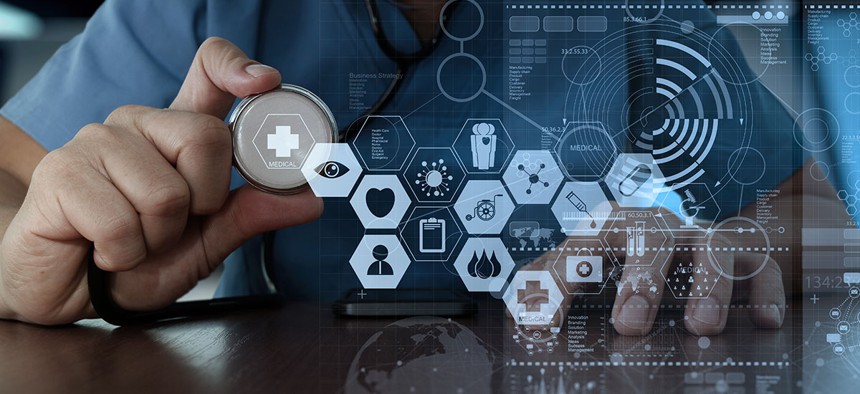Lawmakers: Who Safeguards Health Care Data from Cyberthreats?

everything possible/Shutterstock.com
While fitness trackers and calorie-counting apps might help patients manage their wellness, “who has access to all of this data, and is it being stored securely?” asked Jessica Rich, director of the Federal Trade Commission’s Bureau of Consumer Protection.
Fitness trackers and other wearables could be feeding a steady stream of biological data into your electronic health records. Instead of asking at your next check-up whether you’ve been exercising, your doctor could receive real-time updates, and come to the appointment with a fuller picture of your lifestyle. And if you’re a patient coming from a hospital system in a different state, your electronic records could be sent over to your new provider before you get there, seamlessly plugging into its database.
So, why aren’t all health care providers connecting patient health records?
It’s complicated, witnesses told lawmakers Tuesday during a House oversight committee hearing on health care IT.
State and federal laws surrounding patient privacy make it difficult to exchange health information across borders, in a process known as “information blocking,” witnesses said. Even if they can be exchanged, records aren’t always uniformly formatted.
And the U.S. medical system usually operates on a fee-for-service basis -- charging patients based on the volume of procedures they receive -- instead of on the outcome of their care.
During the hearing, lawmakers and witnesses agreed patients' ability to update their own health records could benefit their care. Tools such as the prescription drug electronic monitoring database could help physicians make sure drugs are prescribed only when necessary.
But it isn’t clear how that data can be shielded from cyberthreats.
While products like FitBit, the wearable fitness tracker, and calorie-counting apps might help patients manage their wellness, “who has access to all of this data, and is it being stored securely?” Jessica Rich, director of the Federal Trade Commission’s Bureau of Consumer Protection, mused during the hearing. Rich said FTC is working with the Department of Health and Human Services to write guidance for health app developers, outlining the laws with which they have to comply.
When health care includes apps and digital devices, activity that happens outside the doctor’s office isn’t necessarily safeguarded under Health Insurance Portability and Accountability Act laws, Rich said -- though it’s usually protected by FTC, which aims to eliminate unfair practices in the marketplace.
For instance, FTC had identified one online billing company that didn’t tell consumers the company planned to collect “highly detailed medical information” from pharmacies, insurance companies and labs, Rich said in written testimony.
But FTC doesn’t generally have the authority to fine companies on their data security practices, Rich said, unless the case involves children’s data or consumer credit information; FTC “seriously need[s]” to “create different incentives here," she added.
Last month, a hospital in southern California reported its patient data was being held hostage, for $3.5 billion in bitcoin, and "ransomware" is increasingly more common, Rich added.
Karen DeSalvo, the national coordinator for health information technology, said her office has convened a cybersecurity taskforce to address some of these issues. The Office of the National Coordinator has also issued written strategies intended to make electronic health records more interoperable.
The barriers to a more connected health system don’t “require legislation,” Mark Savage, a director of health IT policy and programs at the National Partnership for Women and Families, said in written testimony.
“They can be done through federal guidance or assistance that further spurs private sector innovation, by public-private collaboration, and by industry advancements," he added.





